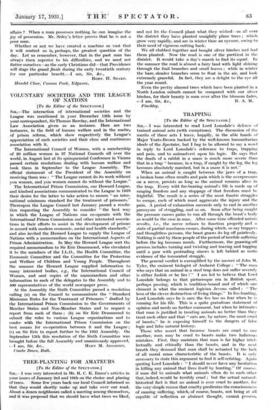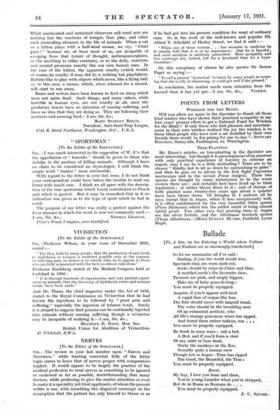TRAPPING
[To the Editor of the SPECTATOR.] Sne,—I was interested to read Lord Lonsdale's defence of trained animal acts (with exceptions). The discussion of the merits of these acts I leave, happily, in the able hands of Major Yeats-Brown backed by the well-known humanitarian ideals of the Spectator, but I beg to be allowed to say a word in reply to Lord Lonsdale's reference to traps, trapping and pain, and to animadvert upon his logic. He says that the death of a rabbit in a snare is much more severe than that in a trap "because, in a trap, if caught by the leg, the leg becomes absolutely numbed, but in a snare it- is not."
When an animal is caught between the 'jaws of. a trap, a broken bone often results and pain which is the overpressure on a nerve, persists as long as the animal remains alive in the trap. Every wild fur-bearing animal's life is made up of ranging freedom and any stoppage of that freedom must be frightful. The. result is a series of the most frantic struggles to escape, each of which must aggravate the injury and the pain. .A period of exhaustion succeeds only to end in another paroxysm Of struggling, and so on. Soon after being caught the pressure causes pains to run all through the beast's body aim would be the case in man. After some time offended nattfre revolts, i.e., the nerve refuses to function properly and a state of partial numbness ensues, during which, so say trappers and thoughtless persons, the beast gnaws its leg off painlessly. Nothing is said by these people of the period of terrible suffering before the leg becomes numb.Furthermore, the gnawing-off process includes turning and ta.lsting and tearing and tugging until a paw with protruding sinews is left behind as mute evidence of the tormented struggle.
The general verdict is exemplified by the answer of John M. Tyler, the eminent biologist of Amherst College : "The man who says that an animal in a steel trap does not suffer severely is either foolish or he lies ! " I am led to believe that Lord Lonsdale belongs to that picturesque era in British sport, perhaps passing, which is tradition-bound and of which one element is what the eminent logician Jevons called : "The love of the clever destruction of living things." In fox-hunting, Lord Lonsdale says he is sure the fox has no fear when he is running for his life. This is a quite gratuitous statement of opinion and needs no further comment, but when he intimates that man is justified in treating animals no better than they treat each other and that "cats are, by nature, the most cruel of beasts," he is exposing himself to the dangers of false logic and false natural history.
Those who assert that because beasts are cruel to one
another, man may be cruel to beasts make two ludicrous mistakes. First, they maintain that man is far higher intel- lectually and ethically than the beasts, and in the next breath they demand that man shall be actuated by the lack of all moral sense characteristic of the beasts. It is only necessary to state this argument to find it self-refuting. Again quoting Lord Lonsdale : "I should never have any hesitation in killing any animal that lived itself by hunting." Of course, if man -did to animals what animals -often do to each other that, indeed, would be terribly cruel ; but the actual natural- historical fact is that no animal is ever cruel to another, for the very simple reason that cruelty predicates the consciousness of causing suffering, which, of course, beasts, not being at all capable of reflection or abstract thought, cannot possess.
What uneducated and untrained observers call cruel acts are nothing but the reactions of hunger, fear, play, and other such controlling elements in the life of animals. When a cat or a kitten plays with a half-dead mouse, we cry, "Cruel puss ! " because we, at least most of us, are incapable of escaping from that tyrant of thought, anthropomorphism, or the ascribing to other creatures, or to the deity, reactions and mental processes exactly like our own human ones. In the case of the kitten, the apparent cruelty (which would, of course, be cruelty if man did it) is nothing but playfulness. Kittens like to play with objects which move, like a flying ball, or, in this case, a mouse, which, when released for a second, will start to run away.
Bears and wolves have been known to feed on sheep which were not quite dead. Such things, and many others, while horrible in human eyes, are not cruelty at all, since the predatory beasts have no intention of causing suffering, and have no idea that they are doing so. They are following their instincts and securing food.—I am, Sir, &c., MARY STANLEY BRECK, President, Anti-Steel-Trap League. 1731 K Street Northwest, Washington, D.C., U.S.A.





































 Previous page
Previous page